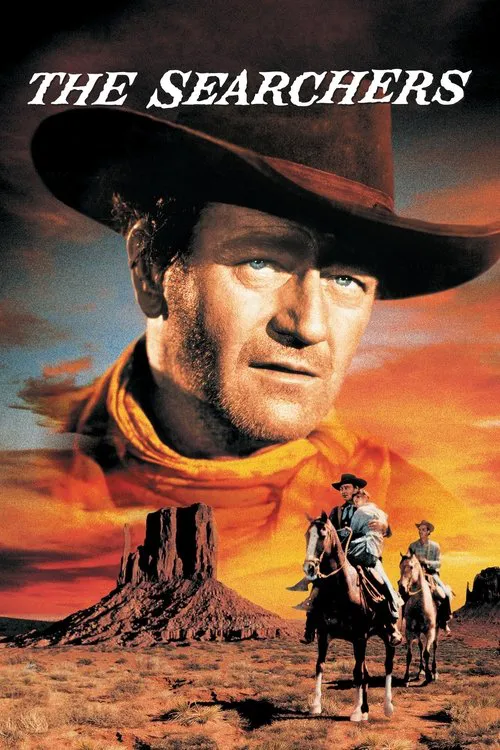The Searchers

Plot
Directed by John Ford in 1956, "The Searchers" is a classic Western film that has left an indelible mark on cinematic history. Based on the 1953 novel "The Searchers" by Alan Le May, the movie tells the story of Ethan Edwards, a Civil War veteran who returns to Texas in 1868. Played by John Wayne in a performance that solidified his place as Hollywood's greatest icon, Ethan is a complex and enigmatic character, driven by a mix of love, hate, and a sense of loyalty. The story begins with Ethan's return home, where he is welcomed by his brother Aaron, played by Harry Carey Jr., and Aaron's wife, Martha, and their three children, including the young and adventurous Debbie. Ethan's niece, Debbie, is kidnapped by a band of Comanches during a raid on the Edwards' farm, leaving behind a trail of blood and chaos. Ethan's brother, Aaron, sets out on a rescue mission, but soon after realizes that Debbie is the only survivor. Ethan, fueled by a desire to find and rescue his niece, takes up the quest himself, driven by a fierce determination that borders on obsession. As Ethan sets out on his long and treacherous journey, he is joined by his nephew, also named Ethan, played by Jeffrey Hunter. The young Ethan is fascinated by his uncle's stories and is eager to prove himself as a worthy ally. Together, the two men embark on a perilous journey across the American West, facing numerous challenges, including hostile Native American tribes, harsh weather conditions, and treacherous terrain. As Ethan's search for Debbie continues, his motivations begin to shift from a pure desire to rescue his niece to a more complex mix of emotions, including resentment, anger, and even hatred. His fixation on Debbie becomes increasingly all-consuming, and his actions begin to question the morality of his pursuit. Ethan's obsession with finding Debbie leads him to confront his own dark past, including his experiences as a soldier during the Civil War and his complicated relationships with his family. Throughout the movie, John Ford employs a range of cinematic techniques to convey Ethan's emotions and psyche. Long close-ups of Ethan's face reveal a complex and often conflicted individual, torn between his love for his niece and his anger towards the Native American tribes who have captured her. Ford's use of composition and lighting also adds to the tension and drama of the scenes, often using shadows and low-angle shots to convey Ethan's sense of vulnerability and aggression. One of the most striking aspects of "The Searchers" is its treatment of Native Americans. While the movie is often criticized for its depiction of racial stereotypes and prejudices, it is also clear that Ford aimed to portray the complexities of the conflict between white settlers and Native American tribes. Ethan's character is often critical of Native Americans, viewing them as savages who deserve to be punished for their actions. However, as his journey progresses, he begins to grapple with the moral implications of his actions, and his perspective on the Native American tribes begins to shift. Despite its flaws, "The Searchers" remains a powerful and thought-provoking film that challenges the viewer to question their own attitudes towards violence, racism, and morality. The movie's climax, in which Ethan finally confronts the tribe that captured Debbie, is both thrilling and emotionally resonant, and serves as a powerful exploration of the complexities of human nature. John Wayne's performance as Ethan Edwards has become iconic, and his presence on screen is at once commanding and captivating. Ultimately, "The Searchers" is a landmark film that continues to captivate audiences with its rich characters, stunning cinematography, and thought-provoking themes. While its portrayal of Native Americans is problematic, the movie's exploration of human nature, morality, and the complexities of conflict makes it a rich and rewarding viewing experience that continues to inspire and provoke audiences to this day.
Reviews
Recommendations




